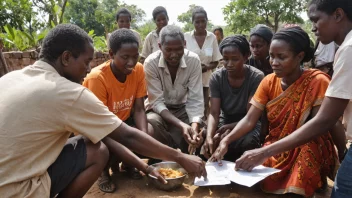What are public health initiatives?
Public health initiatives are organized efforts by governments, non-profit organizations, and communities to improve health and well-being. These initiatives focus on preventing disease, promoting health education, and ensuring access to healthcare services. By addressing the health needs of communities, public health initiatives play a crucial role in poverty reduction.
How do public health initiatives contribute to poverty reduction?
Public health initiatives contribute to poverty reduction by improving health outcomes, which in turn enhances economic productivity. Healthier individuals are better able to work, attend school, and contribute to their communities. Additionally, when healthcare services are accessible and affordable, families can save money on medical expenses, allowing them to invest in their education and livelihoods.
What are some successful examples of public health initiatives?
- The Global Fund to Fight AIDS, Tuberculosis and Malaria: This initiative has provided funding to combat these diseases in low- and middle-income countries, significantly reducing mortality rates and improving health outcomes.
- Vaccination Programs: Initiatives like GAVI, the Vaccine Alliance, have increased immunization coverage, preventing diseases that disproportionately affect impoverished populations.
- Clean Water and Sanitation Projects: Programs aimed at providing clean drinking water and proper sanitation facilities have drastically reduced waterborne diseases, improving health and productivity.
What role does education play in public health initiatives?
Education is a cornerstone of public health initiatives. Health education empowers individuals with knowledge about disease prevention, healthy lifestyles, and access to healthcare resources. Educated communities are more likely to engage in preventive health behaviors, seek medical care when needed, and advocate for better health policies.
How can individuals get involved in public health initiatives?
- Volunteer: Many organizations seek volunteers to help with health education, outreach, and support services.
- Advocate: Raise awareness about public health issues in your community and advocate for policies that support health initiatives.
- Educate Yourself and Others: Learn about public health topics and share this knowledge within your community.
What challenges do public health initiatives face?
Public health initiatives often face challenges such as funding limitations, political instability, and cultural barriers. Additionally, misinformation about health issues can hinder the effectiveness of these programs. Overcoming these challenges requires collaboration among governments, NGOs, and communities to create sustainable solutions.
How do public health initiatives address mental health?
Mental health is an integral part of overall health and well-being. Public health initiatives address mental health by promoting awareness, reducing stigma, and providing access to mental health services. Programs that integrate mental health care into primary healthcare settings have proven effective in improving outcomes for individuals living in poverty.
What is the future of public health initiatives in poverty reduction?
The future of public health initiatives in poverty reduction looks promising, with an increasing recognition of the social determinants of health. As more organizations focus on holistic approaches that combine health, education, and economic empowerment, we can expect further progress in alleviating poverty and improving community health.






